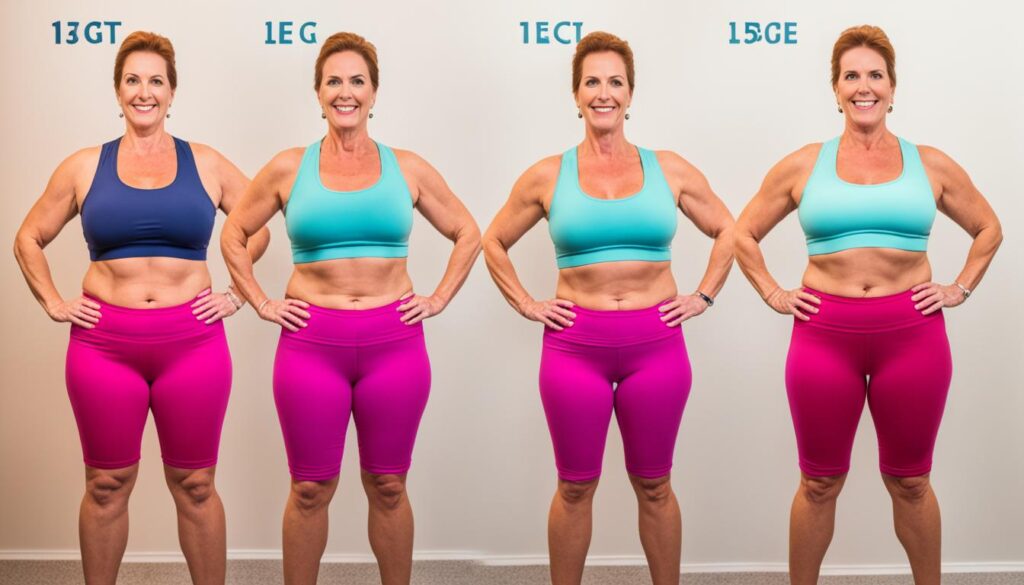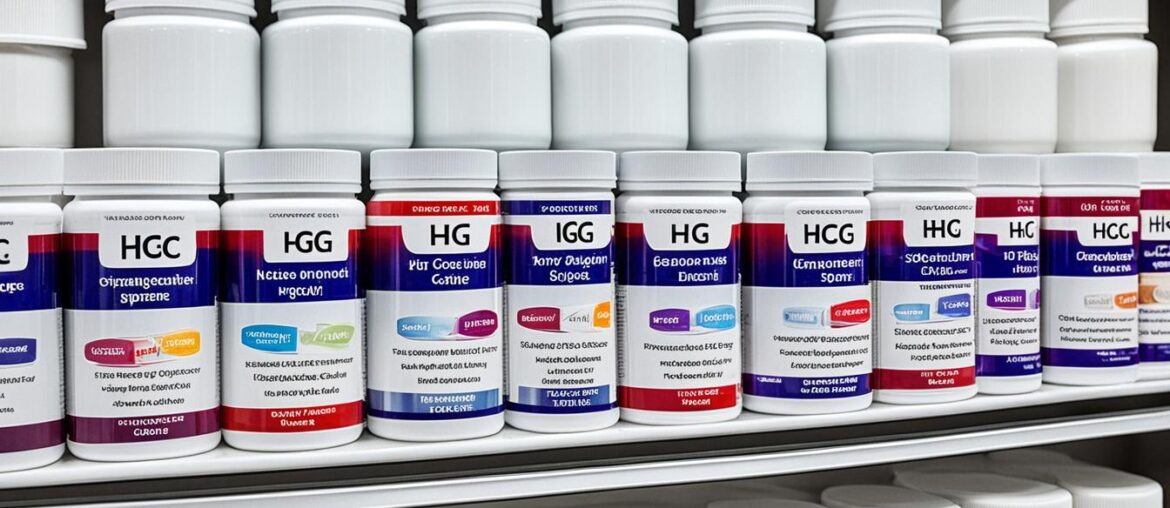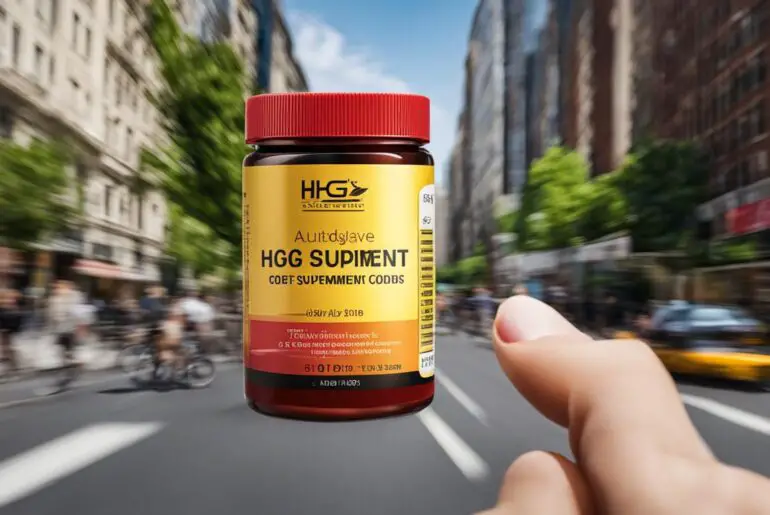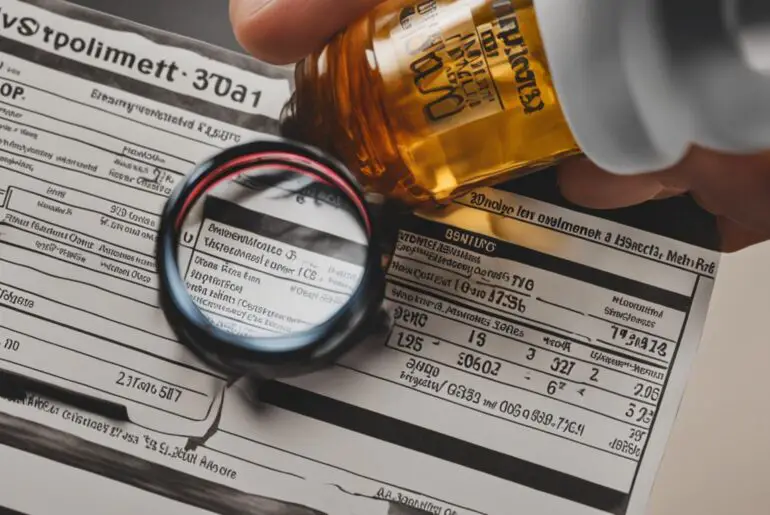Did you know that the HCG diet is not approved for weight loss by the FDA? It may come as a surprise, but HCG medications are required to carry a label stating that they are not effective for weight loss. Despite this, many people still turn to HCG diet supplements in hopes of shedding pounds quickly. If you’re considering incorporating HCG diet supplements into your weight loss journey, it’s important to understand the risks and make an informed decision. Let’s explore how to choose the best HCG diet supplements and make choices that prioritize your health and well-being.
Key Takeaways:
- The HCG diet is not approved by the FDA for weight loss.
- Severe calorie restriction is a key component of the HCG diet.
- Safer methods for weight loss include maintaining a balanced diet and regular exercise.
- When choosing HCG diet supplements, it’s essential to consider scientific evidence, safety concerns, and FDA approval.
- Consulting with a healthcare provider is crucial for personalized guidance and support.
The Science Behind HCG Diet
The HCG diet combines a very low-calorie diet with the hormone HCG. The theory behind the diet is that the HCG hormone will improve metabolism and reduce hunger, leading to increased calorie burning and weight loss. However, scientific studies have found that the HCG diet is not an effective method of weight loss. The weight loss experienced on the diet is primarily due to the low caloric intake rather than the HCG hormone itself. The FDA disapproves of HCG for weight loss and is actively working to remove HCG products labeled for weight loss from the market.
Scientific Evidence:
“Multiple studies have concluded that the weight loss experienced on the HCG diet can be attributed to calorie restriction rather than the HCG hormone itself. The hormone does not have a significant impact on metabolism or appetite suppression.” – Dr. Jane Wilson, Clinical Nutritionist
While proponents of the HCG diet believe in its effectiveness, scientific evidence suggests otherwise. Calorie restriction plays a dominant role in weight loss during the program, as the extremely low-calorie intake leads to rapid shedding of pounds. The HCG hormone has not been proven to have a substantial impact on metabolic function or hunger reduction.
Government Regulatory Concerns:
“The FDA has not approved HCG for weight loss. Companies marketing HCG diet products as effective weight loss aids are in violation of regulations.” – FDA spokesperson
The FDA actively discourages the use of HCG diet products for weight loss. HCG has received approval only as a prescription medication for medical conditions unrelated to weight management, such as fertility treatments. The FDA is taking action to remove HCG products labeled for weight loss from the market, as these products have not undergone the necessary testing to determine their safety and efficacy. This reinforces the importance of opting for weight loss programs with scientifically proven methods.
| Weight Loss Program | Scientifically Supported? | FDA Approved? |
|---|---|---|
| HCG Diet | No | No |
| Multi-Dimensional Approach | Yes | Yes |
| Portion Control | Yes | Yes |
Risks and Safety Concerns

The HCG diet is not without risks and safety concerns. The consumption of an extremely low-calorie diet for a prolonged period can lead to various health complications and nutrient deficiencies. One significant risk associated with the HCG diet is the formation of gallstones. Gallstones are solid particles that develop in the gallbladder due to the rapid and significant weight loss experienced during the diet.
Additionally, severe calorie restriction can result in fatigue, irritability, and other side effects. The FDA has reported cases of blood clots and other serious health issues related to the HCG diet. These risks and safety concerns are the primary reasons why the FDA does not approve the HCG diet for weight loss purposes.
Companies selling over-the-counter HCG diet products are breaking the law, as these products have not been evaluated for safety or effectiveness by the FDA. It is essential to prioritize your health and consult with a healthcare professional before embarking on any diet or weight loss program.
To provide a comprehensive overview of the risks and safety concerns associated with the HCG diet, the following table highlights the potential dangers:
| Risks | Safety Concerns |
|---|---|
| Nutrient deficiencies | Lack of FDA approval |
| Gallstone formation | Over-the-counter HCG products |
| Irregular heartbeat | Health complications |
| Fatigue | Serious side effects |
It is crucial to understand and weigh the risks and safety concerns associated with the HCG diet before considering it as a weight loss option. Instead, focusing on safer and evidence-based approaches to weight loss, such as a balanced diet and regular exercise, can lead to sustainable and long-term results.
References:
- Food and Drug Administration (FDA)
- National Institute of Diabetes and Digestive and Kidney Diseases (NIDDK)
The Importance of Vitamins on the HCG Diet
During the 500-calorie phase of the HCG diet, it is important to consider the role of vitamins and supplementation. While vitamins are essential for overall health and well-being, it is recommended to postpone vitamin supplementation during this phase. The reason for this is that many vitamins often contain calories, sugars, and oils that can hinder weight loss efforts. Since the HCG diet relies on severe calorie restriction and the use of stored fat for energy, introducing additional calories through vitamin supplementation can counteract the intended results.
It is important to note that during the HCG phase, the body can obtain the necessary nutrition from the stored fat and the limited food intake allowed. The HCG hormone triggers the release of stored fat, which provides the energy needed by the body during this phase. Therefore, while vitamin supplementation may be necessary under normal circumstances, it is advisable to prioritize the body’s natural ability to obtain nutrition during the HCG diet.
However, after completing the HCG phase and transitioning to a higher-calorie phase, it is recommended to resume vitamin supplementation to ensure adequate nutrition. This is particularly important as the body adjusts to a more balanced eating plan. Vitamins play a crucial role in supporting overall health and well-being, and it is essential to replenish any potential nutrient deficiencies that may have occurred during the low-calorie phase.
It is advisable to consult with a healthcare provider or a registered dietitian before starting any vitamin supplementation during the HCG diet. They can provide personalized guidance and recommend appropriate supplements based on individual nutritional needs and health considerations. Additionally, it is important to choose high-quality, reputable vitamin supplements that align with the dietary restrictions of the HCG diet.
While the HCG diet may offer weight loss benefits for some individuals, it is crucial to prioritize overall health and well-being throughout the weight loss journey. Proper nutrition, including adequate vitamin intake, plays a vital role in supporting the body’s functions and maintaining optimal health. By understanding the importance of vitamins on the HCG diet and incorporating them appropriately, individuals can enhance their overall nutritional status and promote long-term well-being.
Vitamin B12 and Energy Levels

When following the HCG diet, patients may experience changes in their energy levels due to the restricted calorie intake. To address this concern, many practitioners recommend the use of vitamin B12 supplements. Vitamin B12 is known to play a crucial role in energy metabolism and can help boost energy levels, particularly during low-calorie diets.
It is important, however, to choose B12 supplements that do not contain added sugars or artificial ingredients. The goal is to support energy levels without compromising the dietary restrictions of the HCG diet.
“Vitamin B12 supplements can be beneficial in sustaining energy levels during the HCG diet. However, it is essential to opt for supplements that are free from added sugars and artificial ingredients to maintain adherence to the diet’s guidelines.”
In addition to supporting energy levels, some HCG diet patients may experience leg or muscle cramps. To alleviate these symptoms, homeopathic cell salts can be considered. These cell salts, commonly available in tablet form, can help relieve muscle cramps and promote overall comfort during the diet.
Before incorporating any supplements, it is imperative to carefully check the ingredients and consult with a healthcare provider. They can provide personalized advice and ensure that the chosen supplements align with the dietary restrictions and goals of the HCG diet.
| Vitamin B12 and Energy Levels | Benefits |
|---|---|
| Boosts energy levels | Supports overall well-being during low-calorie intake |
| May alleviate leg and muscle cramps | Enhances comfort during the diet |
| Should not contain added sugars or artificial ingredients | Ensures adherence to the HCG diet guidelines |
The Three Phases of the HCG Diet
The HCG diet is a structured weight loss program that consists of three distinct phases. Each phase has its own set of rules and restrictions to follow, guiding you towards achieving your weight loss goals.
Phase 1: Loading Phase
In the first phase, known as the loading phase, you are required to consume high-calorie, high-fat foods for two days. This phase helps prepare your body for the calorie restrictions that will follow and allows your body to store excess fat that will be utilized during the next phase.
Phase 2: Calorie Restriction
The second phase, lasting three to six weeks, is the main phase of the HCG diet. During this phase, you will need to restrict your daily calorie intake to only 500 calories. This severe calorie restriction is combined with the HCG hormone, either through injections or oral drops, to help suppress hunger and promote fat burning. The diet should be low in fat and strictly limited to lean protein, vegetables, and a small amount of fruit.
Here are some food options to consider during the calorie restriction phase:
- Skinless chicken breast
- White fish
- Shrimp
- Spinach
- Asparagus
- Tomatoes
- Apples
- Strawberries
Phase 3: Stabilization Phase
The final phase of the HCG diet is the stabilization phase. This phase is crucial for transitioning your body back to a normal eating pattern while avoiding sudden weight regain. During this phase, you can gradually increase your food intake, but you must still avoid sugar and carbohydrates. This includes starchy vegetables, grains, and processed foods.
“The HCG diet is divided into three phases: loading, calorie restriction, and stabilization. Each phase has specific rules and food restrictions to follow, aimed at achieving weight loss.”
HCG Diet Food Options
| Protein | Vegetables | Fruits |
|---|---|---|
| Skinless chicken breast | Spinach | Apples |
| White fish | Asparagus | Strawberries |
| Shrimp | Tomatoes |
During the HCG diet, it is important to stay hydrated by drinking plenty of water throughout all phases. It is crucial to follow the dietary guidelines provided during each phase to ensure the effectiveness and safety of the diet.
FDA’s Stance on HCG Diet Products

The HCG diet has gained popularity as a weight loss method, but it is important to understand the FDA’s stance on HCG diet products. The FDA disapproves of HCG products for weight loss and is taking necessary steps to remove these products from the market.
Over-the-counter HCG products labeled as “homeopathic for weight loss” are considered illegal by the FDA. These products have not been evaluated for safety or effectiveness, and their sale for weight loss purposes is against the law. It is vital to be cautious when purchasing HCG diet products and ensure they have proper FDA approval.
It is important to note that FDA-approved HCG products are available only by prescription and are administered specifically as injections. These products have undergone rigorous evaluation by the FDA to ensure safety and efficacy.
When considering the use of HCG diet products, it is crucial to prioritize your health and well-being. Consult with a healthcare professional who can provide personalized guidance and advise on safe and effective weight loss methods.
Risks Related to Illegal HCG Diet Products
Using illegal HCG diet products poses significant risks to your health. Since these products have not undergone FDA evaluation, their safety and effectiveness cannot be guaranteed. By purchasing illegal HCG diet products, you put yourself at risk of potential adverse effects or complications.
The FDA warns against the use of unapproved HCG products, as they may contain unknown and potentially harmful ingredients. It is essential to prioritize your health and only use FDA-approved treatments and products under the guidance of a healthcare provider.
Remember, choosing safe and well-regulated weight loss methods is vital for your overall health and long-term well-being.
The Effectiveness of the HCG Diet

Scientific evidence has consistently shown that the HCG diet is ineffective for sustainable weight loss. While individuals may experience short-term weight loss on the diet, this is primarily due to the severe calorie restriction rather than the HCG hormone.
Multiple studies have demonstrated that the weight loss achieved on the HCG diet is not maintained in the long term. The severe calorie restriction may initially lead to rapid weight loss, but it is not a sustainable or healthy approach.
Instead of relying on the HCG diet, it is important to prioritize evidence-based weight loss methods that focus on a balanced diet and regular exercise. These sustainable approaches have been proven to be more effective for long-term weight loss and overall health.
Scientific Studies on the Effectiveness of the HCG Diet
One study published in the Journal of the American Medical Association (JAMA) found that there was no significant difference in weight loss between individuals on the HCG diet and those on a placebo. The calorie restriction was the main factor contributing to weight loss, not the HCG hormone itself.
Another review published in the British Journal of Clinical Pharmacology concluded that the evidence supporting the effectiveness of the HCG diet is weak and inconsistent. The review highlighted the lack of rigorous scientific studies supporting the claims made by proponents of the HCG diet.
It is important to note that the Food and Drug Administration (FDA) does not approve HCG for weight loss purposes. The FDA has stated that HCG medications are required to carry a label indicating that they are not effective for weight loss.
| Study | Findings |
|---|---|
| Journal of the American Medical Association (JAMA) | No significant difference in weight loss between HCG diet and placebo groups. |
| British Journal of Clinical Pharmacology | Weak and inconsistent evidence supporting the effectiveness of the HCG diet. |
Overall, the scientific evidence overwhelmingly suggests that the HCG diet is not an effective weight loss program. It is crucial to consider evidence-based methods that emphasize a balanced diet and regular exercise for long-term success.
Consultation with a Healthcare Provider

When it comes to weight loss goals and embarking on any weight loss program, including the HCG diet, seeking guidance from a healthcare provider is of utmost importance. Consulting with a healthcare provider allows for personalized advice tailored to individual health needs and weight loss goals.
A healthcare provider possesses the knowledge and expertise to offer safe and sound medical advice. They can provide recommendations on appropriate dietary modifications, ensuring that the weight loss journey aligns with one’s overall health and wellbeing.
Moreover, a healthcare provider can monitor any potential risks or side effects that might arise during the weight loss process. This proactive approach helps to mitigate any health concerns and ensures a safe and successful weight loss journey.
Engaging in a conversation with a healthcare provider offers the opportunity to discuss the benefits and potential drawbacks of the HCG diet, leading to a well-informed decision based on professional advice. Together with the healthcare provider, individuals can explore alternative weight loss strategies that prioritize long-term success and sustainable lifestyle changes.
The Benefits of Consultation with a Healthcare Provider
- A personalized approach to weight loss based on individual health needs and goals.
- Access to safe and trusted medical advice.
- Recommendations on appropriate dietary modifications that align with overall health.
- Monitoring of potential risks or side effects.
- Exploration of alternative weight loss strategies that prioritize long-term success.
Remember, the expertise and guidance of a healthcare provider can be instrumental in achieving weight loss goals while safeguarding overall health and well-being. Make an appointment today and embark on your weight loss journey with confidence.
The Dangers of Severe Calorie Restriction
Severe calorie restriction, as required in the HCG diet, can have significant risks and implications for your health. It’s crucial to understand the potential dangers associated with this extreme eating plan.
One of the risks of severe calorie restriction is the formation of gallstones. When the body doesn’t receive enough dietary fat, bile production decreases, leading to the accumulation of cholesterol in the gallbladder. This can result in the formation of painful gallstones that may require medical intervention.
Nutrient deficiencies are another concern with severe calorie restriction. When you severely limit your caloric intake, you may not consume enough essential vitamins, minerals, and macronutrients necessary for optimal bodily function. This can lead to imbalances and deficiencies that affect your overall health and well-being.
Electrolyte imbalances and irregular heartbeat can also occur as a result of severe calorie restriction. Electrolytes are essential for maintaining proper nerve and muscle function, and when they are imbalanced, it can affect your heart rhythm and overall cardiovascular health.
To ensure a safer and more sustainable approach to weight loss, it is crucial to prioritize a well-balanced diet that provides adequate nutrients while supporting gradual and healthy weight loss. Consultation with a healthcare provider is highly recommended before embarking on any extreme calorie-restrictive diet, like the HCG diet, as they can provide personalized advice and guidance tailored to your specific needs.
Severe calorie restriction poses risks such as gallstone formation, nutrient deficiencies, electrolyte imbalances, and irregular heartbeat. It is essential to prioritize a balanced diet that supports sustainable weight loss while ensuring proper nutrient intake.
By understanding the potential dangers associated with severe calorie restriction, you can make informed decisions about your weight loss journey and prioritize your overall health and well-being.
Consideration of Safer Weight Loss Methods

When it comes to weight loss, many people often turn to extreme diets in search of quick results. However, it is important to recognize the potential risks associated with such approaches and consider safer and more sustainable alternatives. Rather than relying on fad diets like the HCG diet, prioritizing a balanced diet and regular exercise can lead to healthier and more effective weight loss.
A balanced diet is key to achieving a healthier weight and overall well-being. It involves consuming a variety of foods that provide all the essential nutrients your body needs. Incorporating lean proteins, whole grains, fruits, vegetables, and healthy fats can help optimize your nutrition while promoting weight loss. By nourishing your body with a balanced diet, you provide the necessary fuel for optimal function and natural weight management.
Regular exercise is another crucial component of a safer weight loss journey. Physical activity helps burn calories, build strength, and improve overall fitness. Incorporating both cardiovascular exercises, such as walking, jogging, or cycling, and strength training exercises, such as weightlifting or bodyweight exercises, can help boost your metabolism and promote fat loss. Aim for at least 150 minutes of moderate-intensity aerobic activity or 75 minutes of vigorous-intensity aerobic activity each week, along with muscle-strengthening activities on two or more days.
“The key to safe and sustainable weight loss lies in adopting a balanced diet and regular exercise routine.”
By making gradual changes to your eating habits and lifestyle, you can achieve sustainable weight loss without jeopardizing your overall health. Unlike quick-fix diets that often result in weight regain, safer methods focus on long-term success by promoting healthy habits and behaviors.
Remember, consulting with a healthcare provider is always advisable when embarking on a weight loss journey. They can provide personalized guidance, monitor your progress, and address any potential concerns or health issues along the way.
| Benefits of Safer Weight Loss Methods | Risks of Extreme Diets like the HCG Diet |
|---|---|
|
|
When it comes to weight loss, prioritizing your health should remain the top priority. Opt for safer weight loss methods, such as a balanced diet and regular exercise, to achieve long-lasting results that improve both your physical and mental well-being.
Conclusion
When it comes to choosing HCG diet supplements, it is crucial to prioritize safe and sustainable weight loss practices. There is a lack of scientific evidence supporting the effectiveness of HCG diet supplements, and they can carry associated risks. Instead of relying on unproven diet supplements, focus on alternatives that prioritize overall health and well-being.
Maintaining a balanced diet and engaging in regular exercise are key components of safe weight loss practices. By following a well-rounded and nutritious eating plan, you can support your body’s needs while promoting healthy weight loss. Regular physical activity helps to burn calories and build muscle, contributing to a sustainable weight loss journey.
To ensure personalized guidance and support throughout the weight loss journey, it is essential to consult with a healthcare provider. They can provide expert advice tailored to your specific needs and circumstances. A healthcare provider can offer recommendations on appropriate dietary modifications, monitor potential risks or side effects, and help you develop a comprehensive weight loss plan.
In conclusion, prioritize safe weight loss practices that focus on a balanced diet and regular exercise. While HCG diet supplements may seem tempting, their effectiveness is not supported by scientific evidence. By choosing weight loss alternatives that prioritize overall health and well-being, you can achieve sustainable and long-lasting results.
FAQ
How do I choose HCG diet supplements?
When choosing HCG diet supplements, it is important to consider their lack of scientific evidence and associated risks. Instead, focus on safe and sustainable weight loss practices such as maintaining a balanced diet and regular exercise. Consulting with a healthcare provider is crucial for personalized guidance and support throughout your weight loss journey. Prioritizing overall health and well-being should be the ultimate goal rather than relying on unproven diet supplements.
What is the science behind the HCG diet?
The HCG diet combines a very low-calorie diet with the hormone HCG. The theory behind the diet is that the HCG hormone will improve metabolism and reduce hunger, leading to increased calorie burning and weight loss. However, scientific studies have found that the HCG diet is not an effective method of weight loss. The weight loss experienced on the diet is primarily due to the low caloric intake rather than the HCG hormone itself. The FDA disapproves of HCG for weight loss and is actively working to remove HCG products labeled for weight loss from the market.
What are the risks and safety concerns of the HCG diet?
The HCG diet poses serious risks and safety concerns. Consuming an extremely low-calorie diet for an extended period can lead to nutrient deficiencies, gallstone formation, and other health complications. The FDA has reported incidents of blood clots, fatigue, irritability, and other side effects associated with the HCG diet. Companies selling over-the-counter HCG products for weight loss are breaking the law, as these products have not been evaluated for safety or effectiveness by the FDA.
What is the importance of vitamins on the HCG diet?
During the 500-calorie phase of the HCG diet, it is recommended to postpone vitamin supplementation. This is because vitamins often contain calories, sugars, and oils that can hinder weight loss. The body can obtain the necessary nutrition from stored fat and the limited food intake during the diet. After completing the HCG phase, it is advisable to resume vitamin supplementation to ensure adequate nutrition.
How does vitamin B12 affect energy levels on the HCG diet?
Many practitioners prescribe vitamin B12 supplements to HCG diet patients as it may help increase energy levels. However, it is important to choose B12 supplements that do not contain added sugars or artificial ingredients. Some HCG diet patients may experience leg or muscle cramps, and homeopathic cell salts can be used to alleviate these symptoms. It is crucial to check the ingredients of any supplements used during the HCG diet to ensure they align with the dietary restrictions.
What are the three phases of the HCG diet?
The HCG diet is divided into three phases. The first phase involves consuming high-calorie, high-fat foods for two days. The second phase lasts three to six weeks and requires a daily intake of only 500 calories and minimal fat. The third phase allows for an increase in food intake but restricts the consumption of sugar and carbohydrates. Each phase has specific rules and food restrictions to follow, with the aim of achieving weight loss.
What is the FDA’s stance on HCG diet products?
The FDA disapproves of HCG diet products for weight loss and is actively working to remove these products from the market. Over-the-counter HCG products labeled as “homeopathic for weight loss” are considered illegal and have not been evaluated for safety or effectiveness. The FDA-approved HCG products are only available by prescription, specifically as injections. It is essential to be cautious when purchasing HCG diet products and ensure they have proper FDA approval.
Is the HCG diet an effective method of weight loss?
Scientific studies have consistently found the HCG diet to be ineffective for sustainable weight loss. The weight loss experienced on the diet is primarily due to the severe calorie restriction rather than the HCG hormone. While short-term weight loss may occur, it is generally not maintained in the long term. It is important to consider evidence-based weight loss methods that prioritize a balanced diet and regular exercise for long-term success.
Should I consult with a healthcare provider before starting the HCG diet?
When considering any weight loss program, including the HCG diet, it is crucial to consult with a healthcare provider. They can provide personalized guidance based on individual health needs and weight loss goals. A healthcare provider can offer safe and sound medical advice, recommend appropriate dietary modifications, and monitor any potential risks or side effects.
What are the dangers of severe calorie restriction on the HCG diet?
Severe calorie restriction, as required in the HCG diet, can lead to various health risks. These risks include gallstone formation, irregular heartbeat, nutrient deficiencies, electrolyte imbalances, and other complications. It is crucial to prioritize a well-balanced diet that ensures adequate nutrient intake while supporting sustainable weight loss. Severe calorie restriction should be avoided unless under proper medical supervision.
Are there safer weight loss methods than the HCG diet?
Instead of resorting to extreme diets like the HCG diet, it is advisable to consider safer and more sustainable weight loss methods. These methods include following a balanced diet that incorporates all essential nutrients and engaging in regular physical activity. Sustainable weight loss is achieved through gradual changes in eating habits and lifestyle, rather than short-term, drastic measures that risk compromising overall health.




